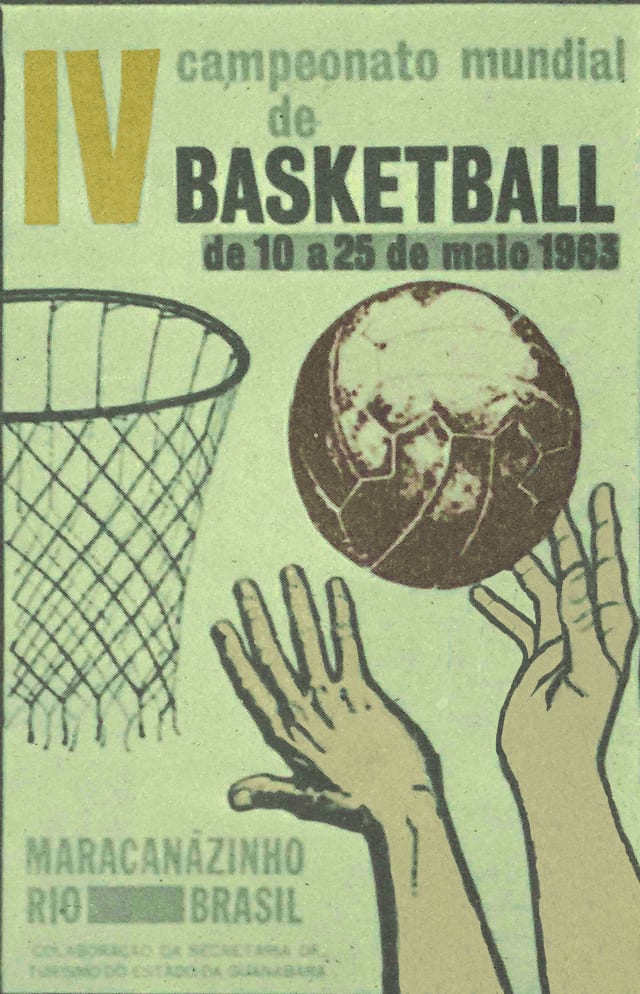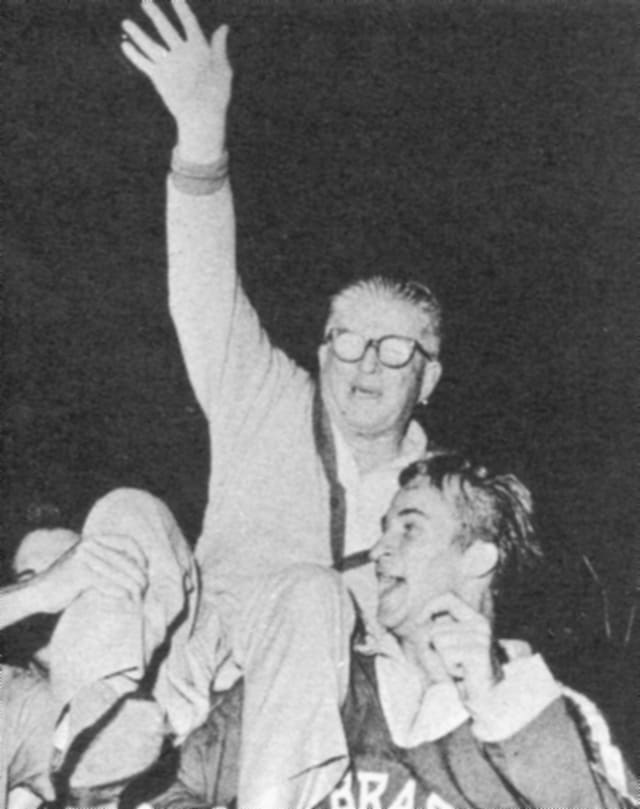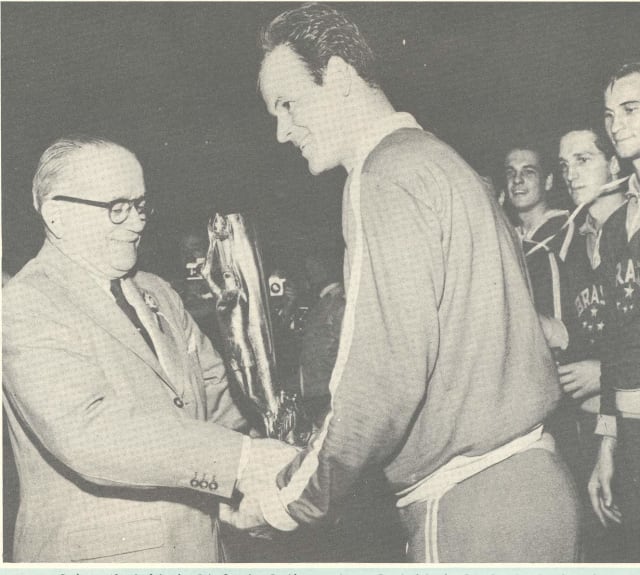The Best of 1963 World Cup: Brazil prove themselves back-to-back; Yugoslavia, USSR reach podium
Brazil became the first nation to capture a second title, hosting the fourth edition of the FIBA Basketball World Cup in 1963 and winning the crown. Yugoslavia claimed second place and Brazil took third.
MIES (Switzerland) - Brazil became the first nation to capture a second title as they hosted the fourth edition of the FIBA Basketball World Cup in 1963 and went undefeated for back-to-back crowns.
It was a trophy they clearly earned after some had questioned the one they had won four years earlier. Yugoslavia claimed second place with Soviet Union taking third place.
The best team: Brazil
| Rank | Team | W-L |
| 1. | Brazil | 6-0 |
| 2. | Yugoslavia | 8-1 |
| 3. | Soviet Union | 7-2 |
| 4. | USA | 6-3 |
| 5. | France | 4-5 |
| 6. | Puerto Rico | 3-6 |
| 7. | Italy | 2-7 |
| 8. | Argentina | 4-4 |
| 9. | Mexico | 4-4 |
| 10. | Uruguay | 4-4 |
| 11. | Canada | 3-5 |
| 12. | Peru | 2-6 |
| 13. | Japan | 1-7 |
The World Cup, known as the FIBA World Championship at the time, was supposed to be played in 1962 in Manila, Philipppines, but the tournament was relocated to Brazil - hosts of the 1954 spectacle - and pushed it back to May 12-25, 1963.
Just as in 1959, 13 teams participated: hosts Brazil; Olympic champions USA; Peru, Uruguay and Argentina from the South American Championship; Soviet Union, Yugoslavia and France from the European Championship; and invited teams Canada, Mexico and Puerto Rico from the Americas, Italy from Europe and Japan from Asia.

Brazil received a direct bye into the seven-team Final Round while the other 12 teams played in three groups of four, with the top two finishers joining hosts Brazil. Soviet Union, Yugoslavia and USA all took first place in their respective groups and were joined by second placed teams France, Puerto Rico and Italy.
Some of the early highlights of the Final Round were Yugoslavia beating USA 75-73; Soviet Union narrowly defeating USA 75-74; and Brazil getting past Yugoslavia 90-71.
On the third to last day, Brazil and Soviet Union were both undefeated and the hosts were extra motivated because many in world basketball thought Soviet Union had the better team at the 1959 World Cup and actually beat Brazil twice before being disqualified for not playing Formosa.
The South Americans, who ended up taking the trophy in 1959, wanted to show they deserved the title as world champions and the trio of Amaury Pasos, Wlamir Marques and Victor Mirshauswka combined for 63 points in a 90-79 win over the Soviets.
Brazil were not yet guaranteed the crown though and that came only after they defeated USA 85-81 in the final game of the tournament. Virtually the same USA team had defeated Brazil 78-66 just weeks early to take the title at the 1963 Pan American Games in Sao Paulo, Brazil.
The penultimate World Cup game saw Yugoslavia down Soviet Union 69-67 to grab second place at 5-1 in the Final Round and the Soviets third at 4-2 - both teams reaching the podium for the first time.

The best player: Wlamir Marques MVP
Another Brazilan championship meant another Brazilian MVP, and this time it was Wlamir Marques, who led the team in scoring with 18.0 points - including his three biggest outputs in the three biggest games.
He scored 24 points against Yugoslavia, 20 versus Soviet Union and poured in 26 points in the win over USA.

Joining him on the All-Tournament Team were his teammate, the 1959 World Cup MVP Amaury Pasos, who was right behind Marques in scoring with 17.7 points per game, Don Kojis of USA, France's Maxime Dorigo and Aleksandr Petrov from the Soviet Union.
The best game : Soviet Union vs Yugoslavia
Two of the biggest powers in world basketball collected their first podium finishes in Brazil as Yugoslavia claimed second place - the first of 10 top-three finishes in 11 tournaments between 1963 and 2002; and Soviet Union's third place was the start of eight consecutive tournaments with hardware.
And the 1963 showdown between Yugoslavia and Soviet Union essentially for second and third place lived up to its billing. Both teams had legendary coaches patrolling the sidelines with Alexander Gomelsky for the Soviets and Aleksandar Nikolic for the Yugoslavs. Nemanja Djuric poured in 32 points on a Yugoslav team that also included future Hall of Fame teammates Radivoje Korac and Ivo Daneu.
Long-time Soviet star Gennadi Volnov countered with 14 points in the loss.
The best performance: Ricardo Duarte
The sixth day of the 8th-13th classification round turned out to feature the top performance of the tournament as Peru's Ricardo Duarte was unstoppable for Japan as he poured in 42 points in a 95-85 victory.
The win essentially made sure Peru would not finish last, taking 12th place over Japan.
Stats leaders
Scorers
| Player (country) | Points Per Game |
| Ricardo Durarte (Peru) | 23.1 |
| Luis Enrique Grajeda (Mexico) | 20.0 |
| Wlamir Marques (Brazil) | 18.0 |
| Amaury Pasos (Brazil) | 17.7 |
| Maxime Dorigo (USA) | 17.2 |
| Alberto Desimone (Argentina) | 16.6 |
| Radivoje Korac (Yugoslavia) | 16.4 |
| Jerry Shipp (USA) | 16.3 |
| Alexandre Petrov (Soviet Union) | 16.3 |
| Rafael Valle (Puerto Rico) | 15.9 |
FIBA